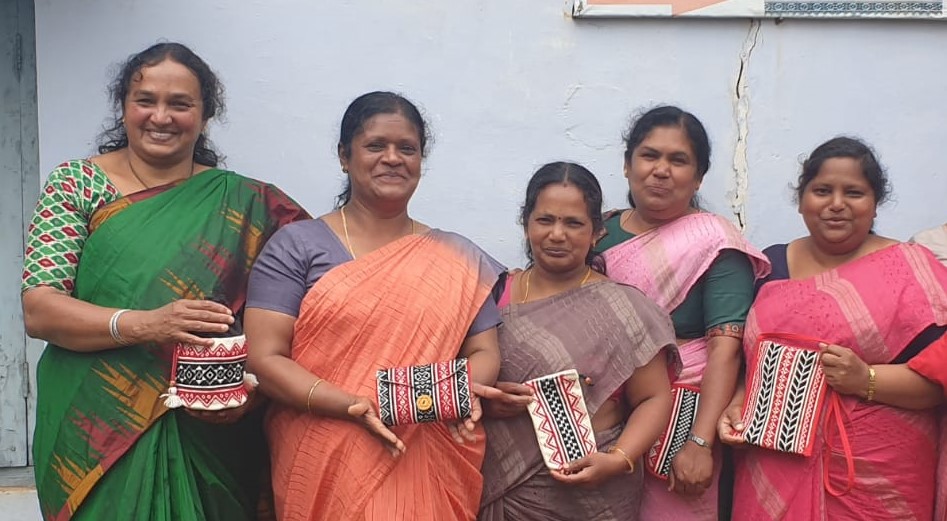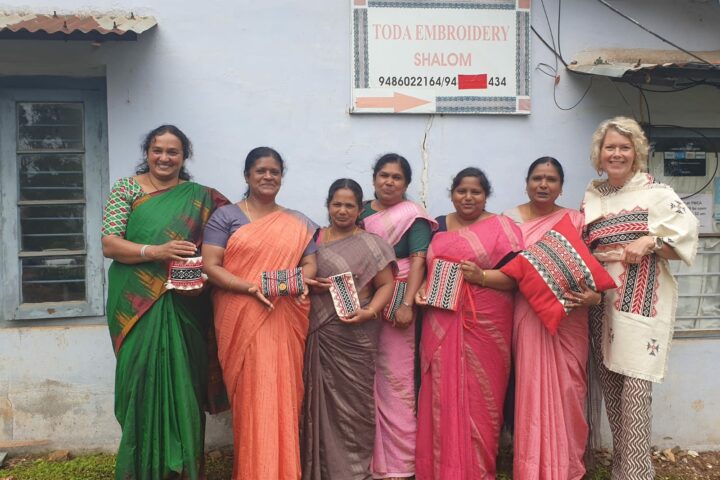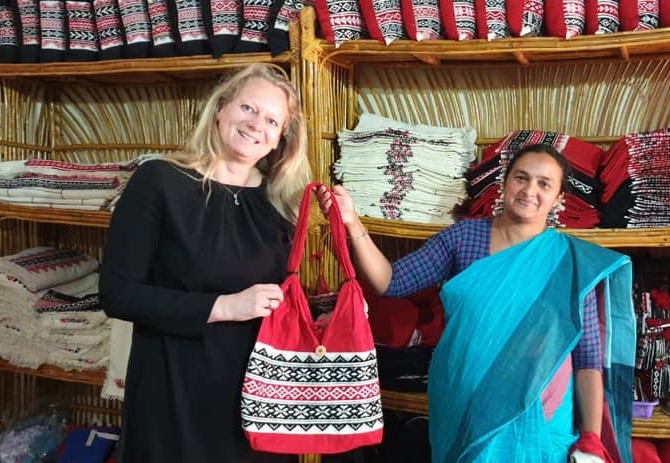In 1992, in the resort town of Ooty in Tamil Nadu’s Western Ghats mountains, Sheela Powell (pictured left of her team) and some other women started an informal self-help group to hatch plans to earn an extra income. Looking for a regular job wasn’t easy with growing kids and demanding unpaid household duties.
The group shared ideas and experiences with each other and together they gradually gained skills, bank loans, and some started their own shops. And that is how Sheela opened her store Shalom Ooty which initially sold quilts, cushions and other household items made by women in the town.
Tribal women wanting a market
However, in the early 2000s, women from the nearby Toda community who knew about her store, began to approach Sheela to sell their beautiful cotton shawls that were embroidered in their tribe’s traditional red and black designs.
Sheela went to school with Toda girls in secondary school and she understood their unique culture and heritage. She saw many Toda women, once her student friends, being oppressed and not having opportunities to empower themselves. These women were becoming grandmothers at age 35 and with freed up time, they sought opportunities to earn an income.
But, they told her that they were having little success selling their work on their own. The reasons were clear, the women lacked knowledge of market demands and language to converse with tourists who were coming to visit the popular summer recreation area.
So, when the opportunity arose, impressed by the unique beauty of the Toda embroidery, she decided to transform her store into a social enterprise to enable these women to strive for increased economic and self independence.
The Toda community and change
The small Toda community is made up of about 1,400 people with 600-800 women. Historically, Toda men rear cows and buffaloes while women look after the many demands of a household and hand embroider the unique designs for their family’s clothing.
While pastoral practices continue, the embroidery could die out as many of the younger women today, due to subsidies, or obtaining higher educations choose to no longer embroider. Which are important and promising steps for these women who have been oppressed from time immemorial, but with change the handicraft will go by the wayside unless preserved.
A tribal craft with Geographical Indication status
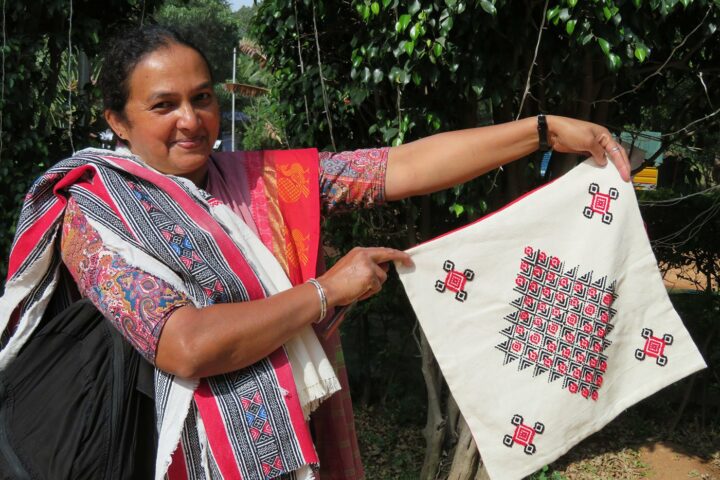
Today Shalom Ooty works with about 200 Toda women between 40 and 65 years old but some are as old as 90. Stitch by stitch, Sheela preserves artistic and historic handicraft through these women in Toda Village and her trained seamstresses in Ooty who finish off their work into usable products.
The uncommon and traditional Toda embroidery designs received the Geographical Indication (GI) tag in 2013. Which means any Toda patterns created outside the Nilgiris district where the Toda are based is an infringement, as is any method of production not done by hand.
There are those who try to make imitations and sell at below market rates but the GI status preserves cultural traditions, ensures uniform pricing for the Toda embroidery that Shalom Ooty and the tribal women produce plus it provides protection against low-quality duplication of the art.
Paying a fair price to preserve a tribal craft
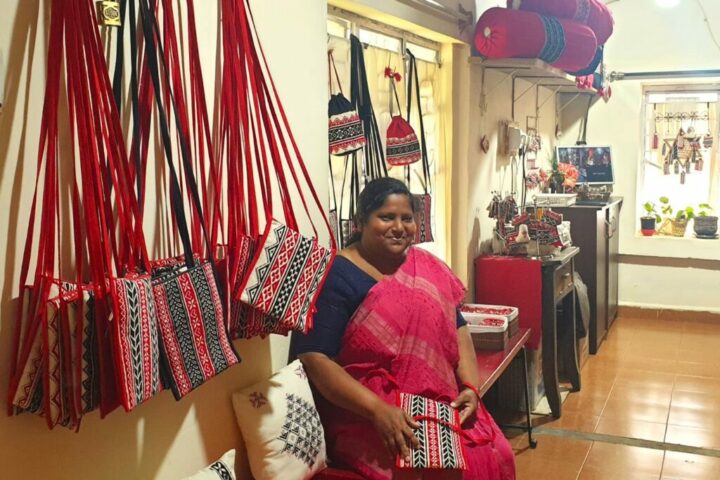
Earlier, the Toda women embroidered shawls, which only the rich tourists would buy. But now Sheela purchases cotton fabric and converts it into pieces for making shawls, cushions, bedcovers, clutches, keychains etc. She gives these cutouts to the women who then create and sew on their own designs.
When the Toda women bring Sheela their completed work, they decide the price themselves, Sheela pays instantly and reimburses their bus fare. Whether she sells the stock or holds it – she says it is now her problem, not theirs. Even during the pandemic, without tourists coming, she continued to buy embroidery to sustain livelihoods.
She loves seeing the Toda women and her Ooty employees gain financial freedom to choose what they want to do with their incomes. Sheela’s employee Epsheba, is sending her daughter to nursing school due to her job with Shalom Ooty.
Future is bright for Toda embroidery
Sheela recently was recognized with the 2024 national craftpreneur award from the Craft Council of Telangana for having brought awareness and appreciation to the heritage embroidery and skills of the Toda community.
Despite sales plummeting during the pandemic Sheela says happily the tourists are now back with a bang at her shop and other venues. Recently with better marketing, online sales are picking up too. She thinks customer mindsets are changing, and they value the traditional, sustainable, pure cotton, handmade quality of the Toda created products for gifts.
Collaborating for a better future: Women on Wings and Shalom Ooty
Women on Wings and Shalom Ooty have collaborated since March 2019 on realizing their joint mission of empowering rural and tribal women economically to create a better future for the next generation.
Sheela says the collaboration has helped. “There are so many hiccups from interacting with the women, the finance, the marketing. Things weren’t very streamlined. We have done workshops with Women on Wings experts Sandra Landsbergen and Marja Versleijen to define a business strategy and to increase sales, quality of the product and help the organization scale up. And we are now working on improving our online presence and sales from channels such as Instagram and Facebook.”
